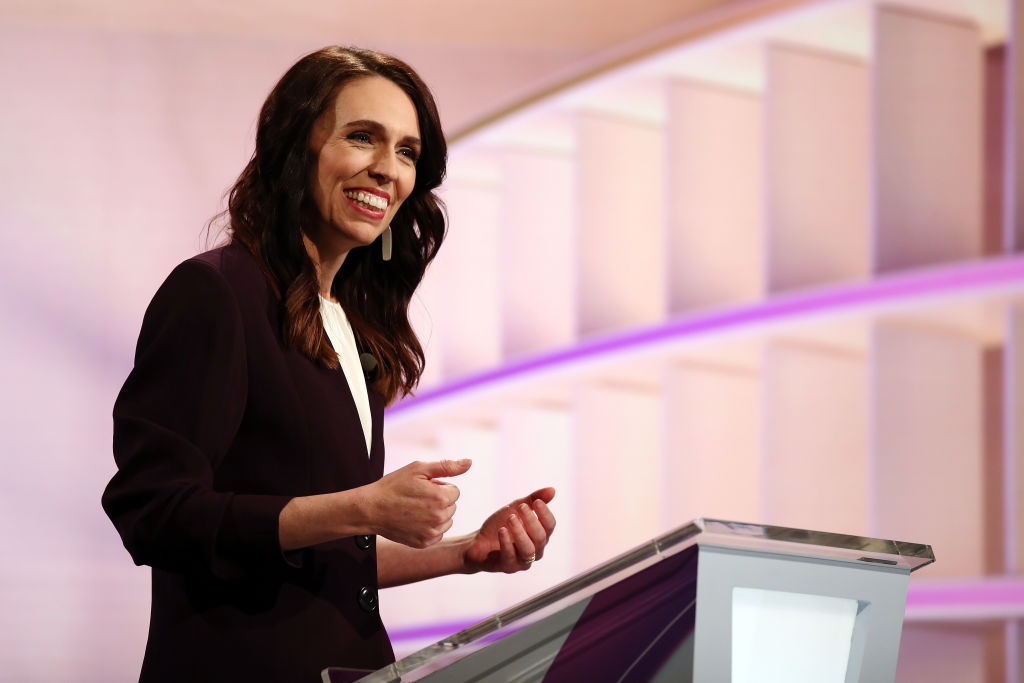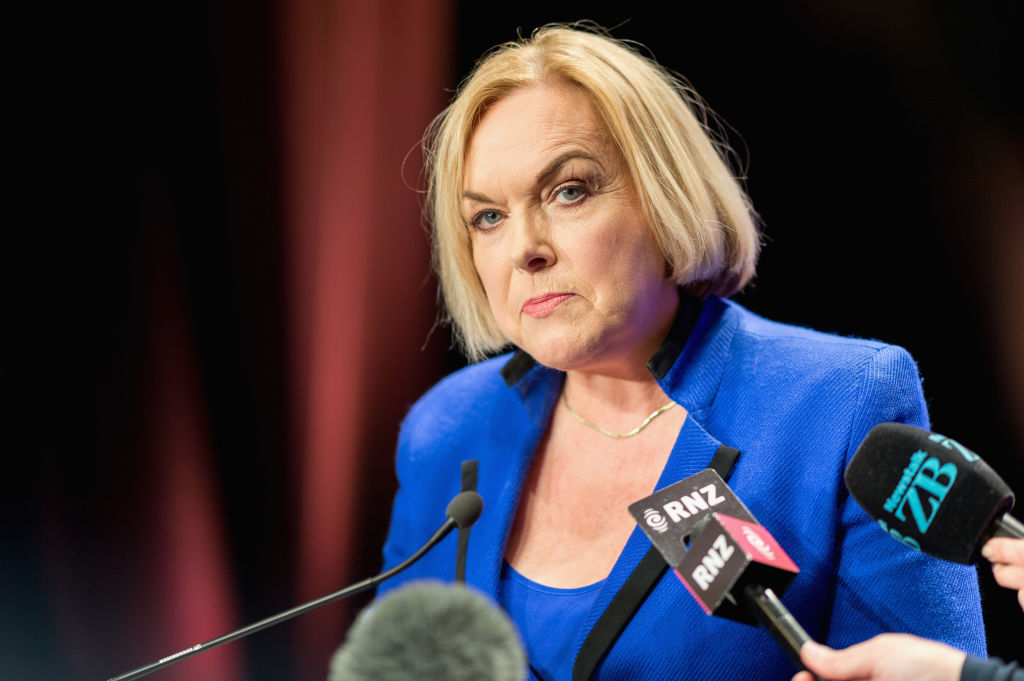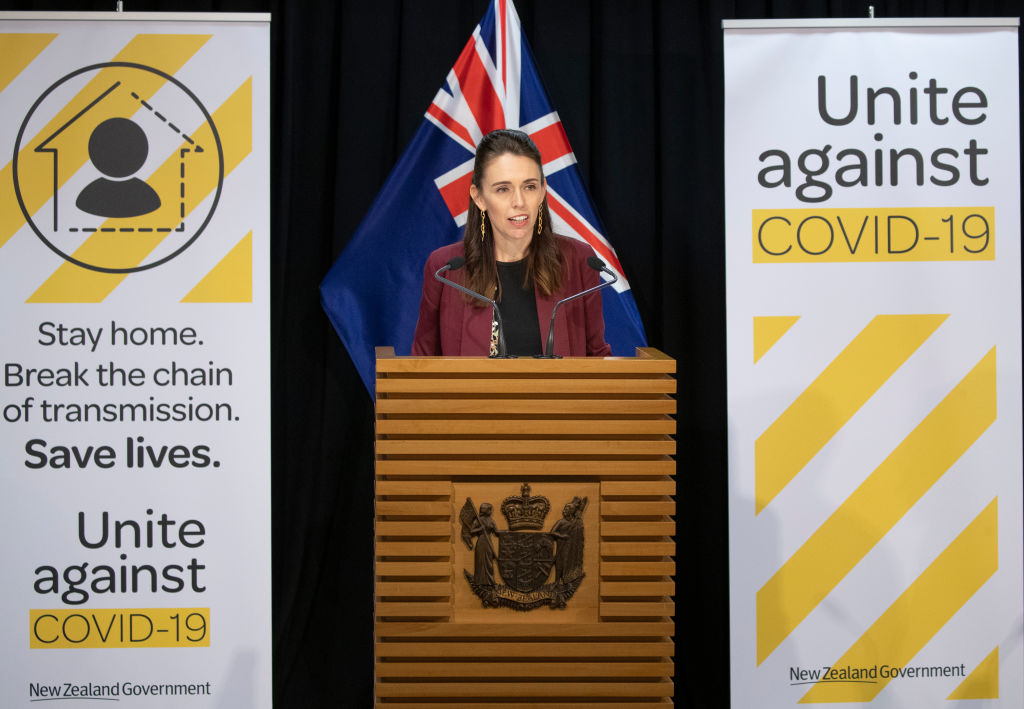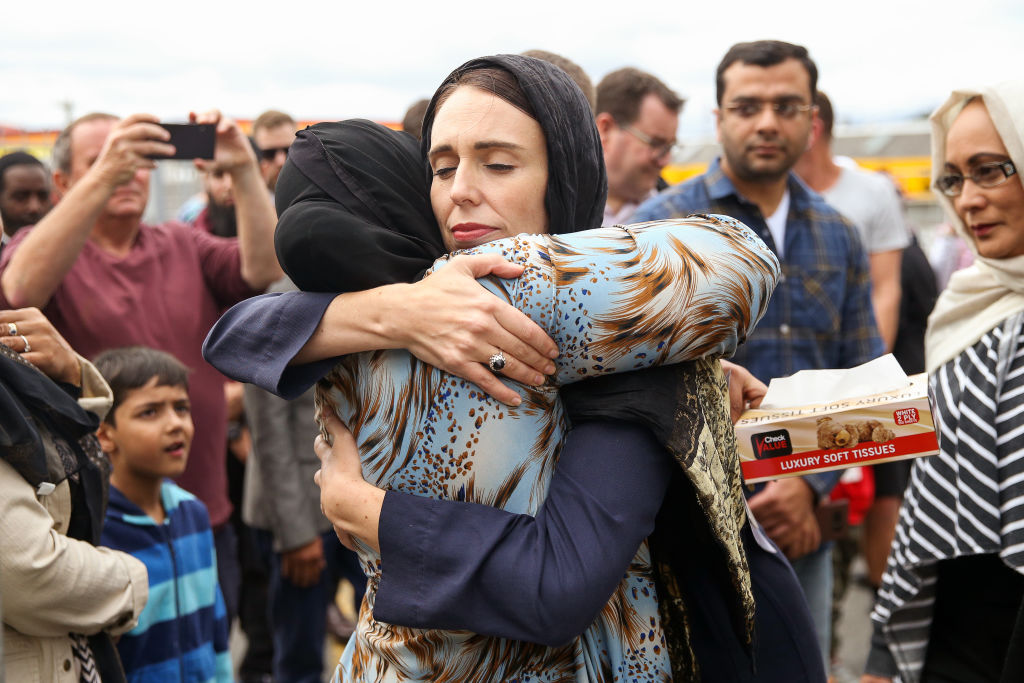
Like many American voters, Lisa Dunn found the Sept. 29 presidential debate frustrating. She made it through a few minutes of the spectacle before she grew so aggravated that she switched it off. “Thank God I live in New Zealand,” she tells TIME with a laugh.
New Zealand had its own debate just hours later, between Prime Minister Jacinda Ardern and challenger Judith Collins, who are facing off in the Oct. 17 election. Dunn, who is from San Diego but moved to New Zealand in 1992, watched almost all of that debate. It wasn’t necessarily friendly, and Collins had plenty of sharp criticism for Ardern and her government. But Dunn, a 59-year-old education advisor, says it made her feel “absolutely proud” of her adopted home. Even though the candidates disagreed on how they will take New Zealand forward, “there was still admiration and civility.”
The tone of the New Zealand election campaign stands in stark contrast to the nasty, partisan politics elsewhere in the democratic world this year—the U.S. especially. During the Sept. 29 debate, Collins, 61, called Ardern, 40, “dear”—something many observers said came off as condescending—but that’s about as far as the name-calling went.
New Zealand, of course, could hardly be more different from the U.S., being a remote island nation of 5 million people, about the size of Cook County, Ill., located 2,500 miles east of Australia. Much of life in there has all but returned to normal after it beat back COVID-19—with crowded music festivals and sporting events and few masks. But the New Zealand election—which takes place a little more than two weeks before U.S. election day—offers hope that democracy can still be fully functional, civil—and even boring—during these unprecedented times.
Experts put New Zealand’s remarkably urbane election down to a difference in political system and culture.
Kiwis, by and large, have a high level of trust in the government and institutions, says Richard Shaw, a professor of politics at Massey University. “We just haven’t had the attacks on the fundamental structures of democracy that you’ve experienced [in the U.S.], and you see that being embodied in the two leaders’ debates,” he says. “There’s a fundamental agreement that there are some democratic rules and norms and conventions that we do not breach, and that it is inappropriate even to approach.”
Read more: A Year After Christchurch, Jacinda Ardern Has the World’s Attention. How Will She Use It?
The leaders also generally agree on a topic that will be at the top of mind for voters across the world in 2020: COVID-19. Both say that a tough “elimination strategy,” which aims to wipe out all traces of the coronavirus in the small island nation is the best approach. “We haven’t had in this country the systematic denigration of science and expertise, more generally, that has been the case in the U.S.,” says Shaw.
Robert Patman, a professor of international relations who specializes in U.S. foreign policy at New Zealand’s University of Otago, says that divisions between the country’s major parties are less pronounced than those between Republicans and Democrats in the U.S. “Trump and Biden seem to be talking past each other and speaking as if they belong to different worlds,” he says. Patman says the U.S. operates under a “winner-takes-all” electoral system that has accentuated negative and partisan politics.
By contrast, New Zealand uses a hybrid parliamentary system called “mixed-member proportional representation” that gives voters two votes at the polls—one for the local legislator, or Member of Parliament (MP), and one for which party they want to run the government. The second vote determines what share of New Zealand’s 120-seat in House of Representatives each party is able to hold. No party has won an outright majority under the system since it was implemented in 1996, so coalition governments made up of more than one party are the norm. But some pundits are suggesting that it might be possible for Ardern’s Labour Party to win an outright majority this year.
Patman says the system “tends to squeeze out populism,” which in any case has done itself no favors this year. “People in New Zealand can see how poorly populists in power like Trump, [U.K. Prime Minister Boris] Johnson and [Brazilian President Jair] Bolsonaro have handled COVID-19.”
Who’s running?
There are currently five parties represented in parliament—each requiring a minimum of 5% of the vote to secure a berth. Ardern’s Labour Party and Collins’ National Party usually dominate the polls, which means the prime minister’s race is essentially a contest between them.
But it’s also a bit complicated: Since 1996, every government has been composed of a coalition with at least one other party. The center-left Labour Party secured fewer seats in the 2017 election than the center-right National Party. However, Ardern was able to strike a deal with the nationalist New Zealand First Party as well as the Green Party—which allowed her to take power.
Collins is a tough-talking political veteran who earned the nickname “Crusher Collins” for proposing to destroy the confiscated cars of illegal street racers when she served as police minister. The former lawyer was installed as the leader of the National Party in July.

Read More: Why New Zealand’s Coronavirus Elimination Strategy Is Unlikely to Work in Most Other Places
Despite the campaign being tame by U.S. standards, some experts say the rhetoric this year has been sharper than usual. And that could be down to gender, says Jennifer Curtin, a politics professor and the director of the Public Policy Institute at the University of Auckland. She says that Collins has been more aggressive in her criticism of Ardern and her policies than predecessors. Besides calling her “dear” in the debate, she has referred to the prime minister as “Miss Ardern.”
“I think that is partly her combative style, but also Collins is more easily able to refer to Ardern in this way because she is also a woman,” Curtin says. “I think a male leader would find it difficult to be derisive and not have the public challenge them on it.”
How is COVID-19 affecting the election?
COVID-19 will be at the top of voters’ minds. Ardern’s “go hard, go early” approach against the virus in New Zealand has been one of the world’s most successful pandemic responses, resulting in fewer than 2,000 cases and just 25 deaths. Despite a small resurgence of the virus in August in the country’s largest city, Auckland, a poll that month found that public confidence in health officials and the government to manage the pandemic was above 80%.
“Ardern has provided a masterclass with her political communications from the prime ministerial bully pulpit,” says Shaw, of Massey University.
The outbreak also had the effect of pushing back the election, which was originally scheduled for Sept. 19. Late last year, it looked like Ardern could be on track to lose it. An October 2019 poll showed the National Party with 47% support, its highest level since the 2017 election. Labour polled at just 40%.
But Ardern’s deft handling of COVID-19 has increased her popularity. An April poll showed public support for Ardern and her party soaring while the country was under strict lockdown. The Labour Party has since reached 55% approval, while the opposition National Party has dropped to 29%. Ardern’s personal approval rating has reached 65%, a near record. “By international standards, the Ardern-led Labour government has performed relatively well in dealing with the threat of COVID-19 and many citizens in New Zealand recognize this,” says Patman of the University of Otago.

And Ardern is leaning into her success in her re-election campaign. “When people ask, is this a COVID election, my answer is yes, it is,” Ardern told supporters gathered in Auckland for the launch of Labour’s campaign.
Daily life has the feel of pre-coronavirus normalcy in a way that is all but unthinkable in nearly all of the rest of the world. Masks are seldom seen in public. Pubs are packed. On Oct. 10, Christchurch, New Zealand’s second largest city, held a music festival in the center of the city, with a sellout crowd of 5,000 packed in shoulder to shoulder. The next day, New Zealand’s beloved rugby team, the All Blacks, played Australia in front of a crowd of 30,000 fans in the capital Wellington. The last reported case of community transmission in the country was on Sept. 25—linked to a previously known cluster.
Paul Francis, a 53-year-old from Christchurch who owns a small IT company, voted for the National Party in the 2017 election but he plans to vote Labour this year because of Ardern’s handling of the pandemic. He says he’s not alone.
“I think there’s a lot more people like me considering their Labour options, because of the response that was made,” he tells TIME.
Read More: Jacinda Ardern Helped New Zealand Beat Coronavirus. Next Up: Getting Re-Elected
What do voters think of Ardern’s first term?
Since her election in 2017, Ardern has enjoyed stardom outside New Zealand. She’s been hailed for her progressive values and leadership style and featured on the covers of magazines like Vogue and TIME.
But her image back home has at times been more ambivalent, with criticism of her failure to deliver on campaign promises. Many of the major issues Ardern campaigned on in 2017—such as making housing more affordable and reducing child poverty—remain unfulfilled, says Oliver Hartwich of the think-tank New Zealand Initiative. “Ardern’s first term was a wasted opportunity to implement serious policy reforms,” he says.
But some voters have been able to overlook the unfulfilled promises due to how she’s handled three unexpected crises she faced during her tenure: the Christchurch mosque shootings in March 2019 that left 51 people dead, a deadly volcanic eruption in December 2019 and the global pandemic. Ardern’s response to those tragedies gave many voters trust in her and buoyed support for her party, says politics professor Shaw.
“She had a bit of a shaky start, I wasn’t too sure what to make of her,” says IT entrepreneur Francis. “But as soon as big decisions need to be made I was really impressed with how she handled it.”
Ardern was thrust into the international spotlight by the mosque attack. She emerged as an icon to many when, less than 24 hours after the shooting, she put on a black head scarf to meet members of the Muslim community, earning plaudits for her empathetic response. As the country reeled from the massacre, Ardern proposed changes to gun legislation. Less than a month afterward, New Zealand’s parliament voted to ban military-style semi-automatic weapons by 119 votes to 1.

Her reassuring leadership style received praise again after a volcanic eruption in December 2019 killed more than 20 people; photos circulated of her hugging first responders.
Ranee Brady, a 57-year-old accountant in Christchurch who voted for the National Party in the last election said she plans to support Labour this year because of Ardern’s leadership. “She is the most unusual thing in politics: a nice person,” Brady says. “She’s friendly, approachable, gracious and a bloody good leader.”
What are the other big issues in this election?
Aside from COVID-19, voters are concerned about how the country will recover economically. New Zealand is in its deepest recession in decades.
Shelley Sefton, 45, who owns Diner 66, an American-themed restaurant in Christchurch, says COVID-19 restrictions Adern’s government imposed took a heavy toll on her business. Restaurants were forced to close nationwide for four weeks at the end of March as part of a nation-wide lockdown. After that, they operated as takeaway-only. “I honestly thought she destroyed our business going so hard.”
Thankfully, Diner 66 is busy with guests again. On a recent evening they came to order from a menu that includes Philly cheesesteaks, burgers named after U.S. states (the Kansas is a black bean patty with onion, lettuce, tomato and vegan mayo), and an “Elvis” shake made with peanut butter, banana and bacon. The diner, complete with classic red leather booths and black and white tiled floors, also tries to replicate American portion sizes: Sefton says customers are often too full to finish their meals.
While the restaurateur is grateful for government wage subsidies that helped keep to avoid laying off any staff, she says it’s been tough. “My focus was just trying to keep our staff alive … funding them enough and making sure that they weren’t impacted too much that they were in trouble,” she says. “I think we could’ve been a whole lot better off doing it a different way.”
Sefton, who says she is usually a National Party supporter, plans to vote against Ardern this year.
Housing affordability and child poverty meanwhile remain major issues. Healthcare and climate change have been hot topics of debate.
Voters will also get to have their say in two referendums: one that would decriminalize recreational marijuana use (Arden admitted to it “a long time ago” but says she is not taking sides) and another that would allow some terminally ill people to request assisted dying.
What do the polls say?
At this stage, the Labour Party looks set to win big. Polls from early October suggest that it may win 47% of the vote, which would give it 59 seats in parliament.
Collins’ National Party is polling around 33%. “I can’t see any path to a National Party victory at the moment,” says Shaw.
The big question now appears to be just how well the Ardern’s Labour Party will do. It needs 61 seats for an outright majority—a feat that no party has achieved since the mixed-member proportional system was implemented in 1996. But whichever way the polls go, it seems certain that New Zealand democracy will be the winner.
—With reporting by Mitchell Redman and Nick James / Christchurch, New Zealand
More Must-Reads From TIME
- The 100 Most Influential People of 2024
- The Revolution of Yulia Navalnaya
- 6 Compliments That Land Every Time
- What's the Deal With the Bitcoin Halving?
- If You're Dating Right Now , You're Brave: Column
- The AI That Could Heal a Divided Internet
- Fallout Is a Brilliant Model for the Future of Video Game Adaptations
- Want Weekly Recs on What to Watch, Read, and More? Sign Up for Worth Your Time
Write to Amy Gunia at amy.gunia@time.com